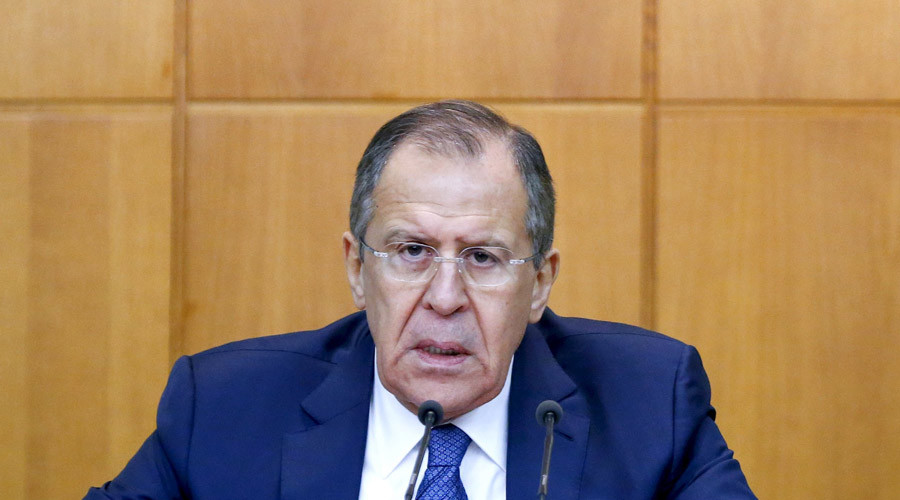The US and the EU are still pursuing a dangerous policy of restraining Russia, including the NATO military build-up near its borders, Russian Foreign Minister Sergey Lavrov has said, adding that Moscow is ready to cooperate on an equal and mutually beneficial basis, the Russian RT reported.
“The policy of restraining Russia continues, though it is high time to drop this policy and file it in the historical archives,” Lavrov told a media briefing in Moscow.
He agreed that relations between Moscow and the West would never be the same again.
“Our western colleagues say sometimes that there will be no more ‘business as usual’ with Russia – and I’m confident that statement is absolutely correct,” Lavrov said.
“There will be no more business as usual after they attempted to impose agreements on us respecting the interests of either the European Union or the US in the first place, trying to convince us that they will not damage our interests,” he said. “That’s over now.”
Moscow is ready for “close, constructive cooperation” with its western partners, yet solely and only on an equal and mutually beneficial basis, “without interference into each other’s internal affairs, with respect for the principal interests of each side,” Lavrov said.
Western countries are still trying to “accrue one-sided benefits” and even attempting “to punish us for conducting an independent international policy,” Lavrov said.
“Of course, we take that into account in our actions. But that’s not our choice.”
NATO’s build-up near Russia’s borders is shortsighted, the Russian foreign minister said, adding that Moscow would keep an eye on the concentration of military potential in neighboring countries.
“Now we see the counterproductive and dangerous policy in relations with Russia, including the build-up of NATO’s military potential near our borders and the creation of global European and Asian segments of a global US missile defense,” Lavrov said.
He added that Moscow considers such actions destabilizing and shortsighted.
Hype surrounding Litvinenko case will ‘worsen’ Russian-British relations
The hype surrounding the Aleksandr Litvinenko case is going to “definitely worsen” Russian-British relations, Sergey Lavrov acknowledged.
Speaking on the conclusions of the public investigation regarding the death of the former FSB officer Litvinenko, who died of polonium poisoning in London in 2006, Lavrov called attention to the “gravest accusations brought against the Russian leadership without providing any evidence at all.”
Lavrov added that should “a savvy lawyer take up the case and analyze the facts and the statements made by the British policymakers, they could be held liable for libel.”
Moscow not interested in crumbling EU
“We’re not interested in the EU getting weaker, leave alone the union splitting up. We are interested in a united and strong European Union, a comfortable partner on the economy and all other issues. But we cannot fail to see the current developments,” Lavrov went on, emphasizing the decisive role of Germany in maintaining EU’s unity.
Syrian peace talks impossible without Kurds
No peace talks to resolve the Syrian crisis can be successful without the Syrian Kurds participating in them, Lavrov said. Yet the final decision on whether to invite the Kurds remains with the UN’s Syria envoy, Staffan de Mistura, and Moscow is not going to veto it.
“We’ve been hearing from certain members of the international Syrian support group, I’d say from one member, doubts about whether the Syrian Kurds, more specifically the Democratic Union Party [PYD], should be invited to the talks. I believe that without that participant the talks will fail to deliver the result we expect, which is a final political settlement in Syria,” Lavrov said, pointing out that the Kurds make up to 15 percent of Syria’s population and inhabit a “considerable, moreover crucial territory.”
Ukraine crisis
Official Kiev perceives Western sanctions against Russia as a license to ignore the conditions of the Minsk-2 agreements, Lavrov said.
“Prolongation of the sanctions is being taken for the West’s agreement that Kiev could abstain from fulfilling the agreements,” he stated.
“We don’t want anyone to form policies out of misconception that it is Russia, not Ukraine, who must fulfill the Minsk-2 agreements,” Lavrov warned, noting that contacts with Victoria Nuland suggest that the US understand the essence of Minsk-2 agreements well.
North Korean ‘thermonuclear test’ questionable
Moscow is not sure that Pyongyang tested a thermonuclear device on January 6, Lavrov said.
If it was actually a thermonuclear test, that would mean that the UN resolution, introducing stiff restrictions on the supply of nuclear materials to North Korea, is not working and that Pyongyang is still managing to acquire what it needs for its military nuclear program, Lavrov said.
“If the test was an explosion of yet another ‘regular’ nuclear device – then the restrictions do work,” he said.
The Russian foreign minister stressed that there should be no nuclear weapons on the Korean peninsula at all, either North Korean or South Korean, nor the “elements of American nuclear weapons that should not be deployed to South Korea.”
The nuclear security of the Korean peninsula cannot be discussed without Pyongyang, Lavrov added.
“We’ve heard those proposals from South Korea to hold a 6-1 meeting, without North Korea. I don’t think this is a good idea, because once again it would mean we’re trying to isolate someone,” Lavrov said, instancing Iran as a country that expanded its nuclear program with a “colossal momentum” with wide international sanctions in place.
M.T

